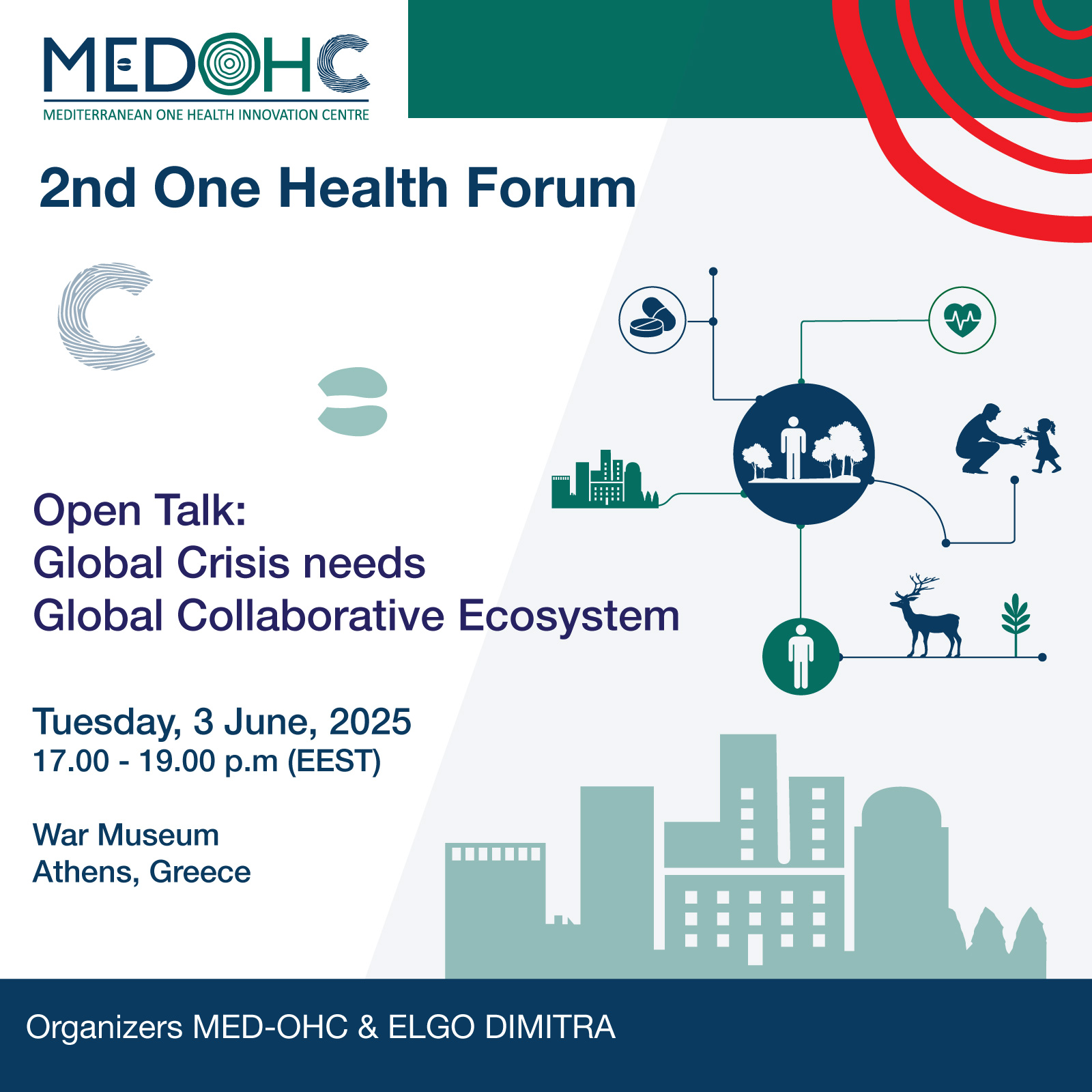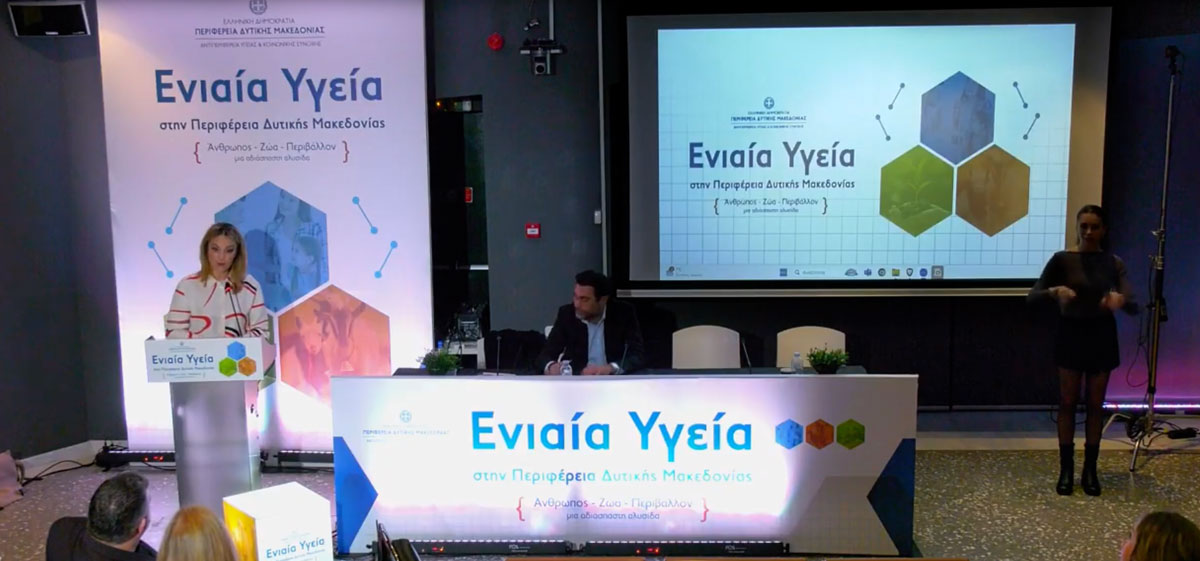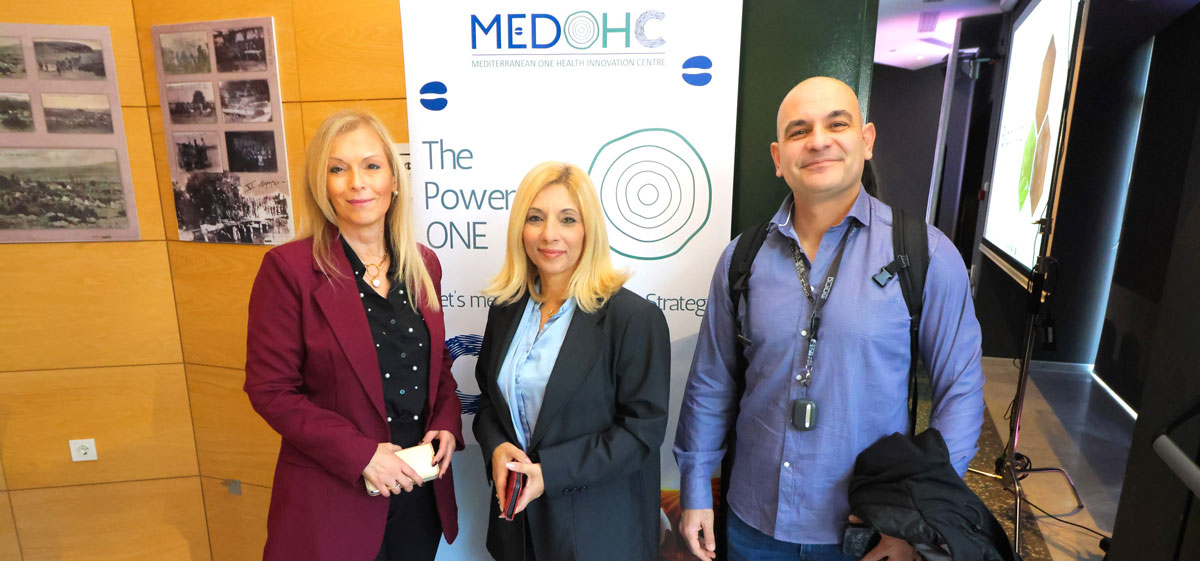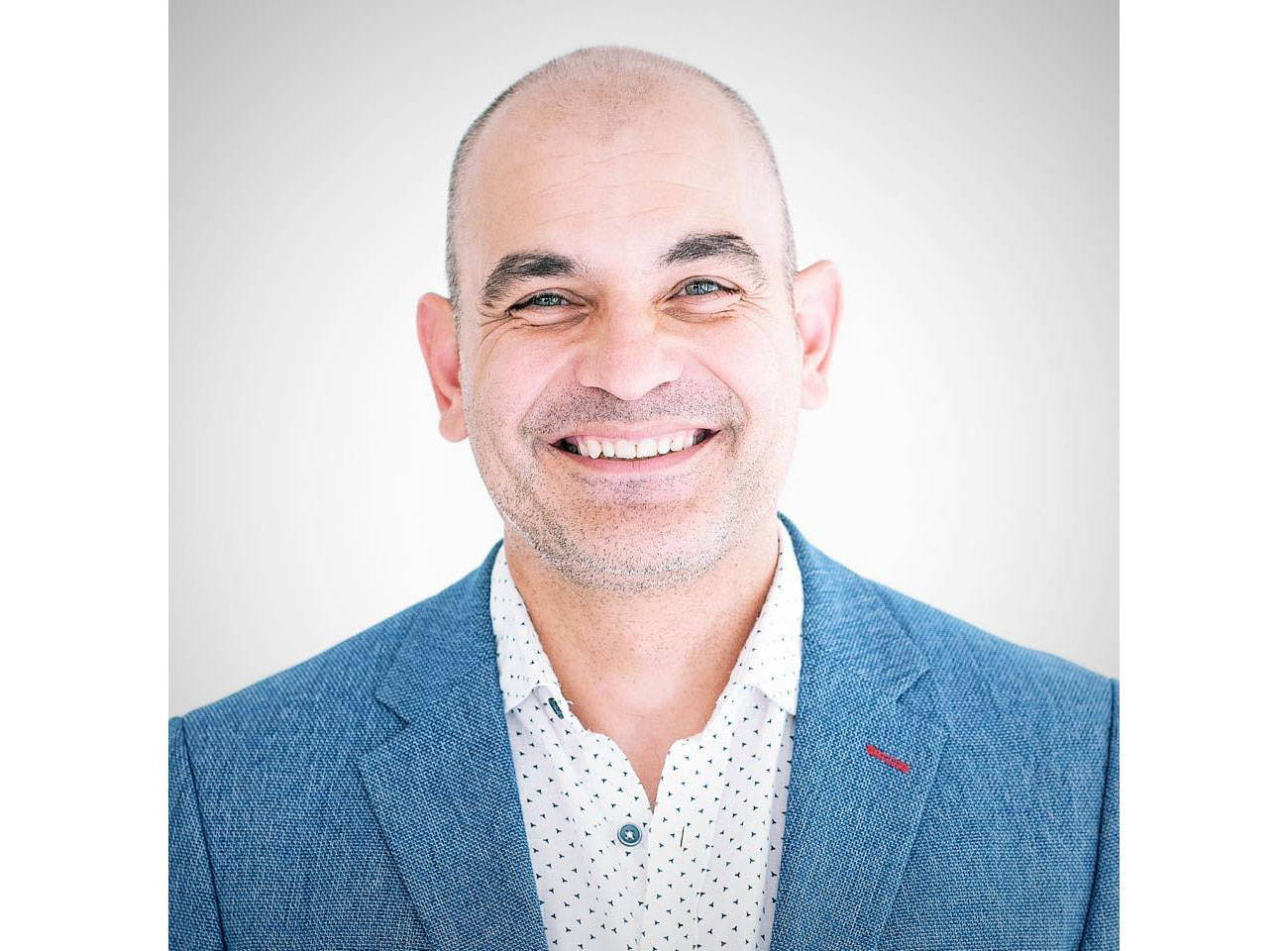Landmark event for One Health in Greece the 2nd One Health Forum at the War Museum
Landmark event for One Health in Greece the 2nd One Health Forum at the War Museum

With a landmark event for the promotion and dissemination of One Health in Greece and the entire Mediterranean, the official presentation of the Mediterranean Innovation Center for One Health (MED-OHC) took place on the afternoon of Tuesday, June 3, at the War Museum of Athens, as part of the proceedings of the 2nd One Health Forum.
The proceedings began with a welcome address by the President of the Mediterranean Center, Eleni Pavlidou, who emphasized that the purpose of the new structure is the united mobilization of scientific forces and fields in the prevention of pandemic, environmental, or food crises.
With Pavlos Efthymiou, General Director of the Hellenic Entrepreneurs Association and Executive Advisor to the Athens Medical Group, as moderator, the introductory speeches followed. They were delivered by Professor and former Vice-Rector of the Agricultural University of Athens, Serko Haroutounian, Vice President of the Executive Committee of FAO (Food and Agriculture Organization) for Europe and Central Asia, Antonis Filippis, President of ELGO – DIMITRA and Professor of the Department of Forestry at Aristotle University of Thessaloniki and President of the Scientific Council of MED-OHC, Zacharoula Andreopoulou. The speakers referred to the general principles of One Health and to the role and prospects of MED-OHC.
The event was greeted by former Prime Minister George Papandreou.
“We stand at a critical crossroads in human history,” Mr. Papandreou said in his address. He added: “75% of new infectious diseases in recent decades come from animals. COVID-19, avian flu, and the Ebola virus are not accidental. They are the result of the destruction of natural habitats and the intensive overexploitation of animals. At the same time, antibiotic resistance—with superbugs—threatens to return us to a pre-antibiotic era. Already, we have 1.27 million direct deaths annually from resistant microbes and nearly 5 million related deaths worldwide—more than malaria and tuberculosis combined.”
“This crisis is not theoretical,” Papandreou continued. “It is our everyday reality. And it reminds us of an unforgiving truth: we—human beings—and therefore our health are not isolated, protected in a bubble. It is inextricably linked to the health of animals, the environment, and the planet itself. That’s why we need a new paradigm, a unifying perspective that will serve as a compass to navigate this turbulent era. That compass is One Health.”
In his greeting, Deputy Minister of Rural Development and Food Christos Kellas stressed that “the MED-OHC is a project that unites the forces of the public and private sectors, aiming to develop it as a hub for biosecurity, prevention, and cooperation in the Mediterranean, highlighting Greece’s strategic role in scientific and agri-food innovation in the region. The official presentation of the Mediterranean Innovation Center for One Health is a strong step toward the future, as the Ministry supports this effort, believing that agricultural policy cannot be disconnected from public health, the environment, and innovation.”
“The heart of One Health beats in the union of science and practice,” said the Deputy Minister, emphasizing the need for collaboration across the entire chain, from research to production. Concluding, Mr. Kellas pointed out that MED-OHC is not just a new Center, but a new strategy for the Mediterranean, with Greece at its core. “From the field to the shelf. And from the lab to the public interest. We are here to unite knowledge, science, and production,” he stressed.
In his greeting, Deputy Minister of Education Nikos Papaioannou expressed his joy in participating in the presentation of MED-OHC, a structure that aims to systematically work toward a sustainable ecosystem.
“The experience of the COVID-19 pandemic highlighted the significant interaction between humans, animals, and the environment and made collaboration imperative. Europe is called to address issues such as quality of life, zoonoses, antimicrobial resistance, and climate change, by creating a unified response ecosystem,” said Mr. Papaioannou.
He continued by sharing his experience from a recent visit to Wuhan, China, where the recent pandemic began.
“Achieving the goals of MED-OHC fully aligns with the crucial role played by Education, as the new national, European, and global environment after the pandemic calls on Universities to reshape and enrich their strategic development plans,” said Mr. Papaioannou. He concluded by calling on all research centers, universities, and stakeholders to contribute so that “cognitive approaches can be developed, moving beyond conventional thinking, to enable us to contribute further.”
Diamantis Golidakis, MP for A’ Region of Thessaloniki with New Democracy and member of the Standing Committee on Social Affairs and the Special Permanent Committee on Research and Technology, noted in his written address that “in an era where challenges concerning human, animal, and environmental health are intertwined and intensifying, the One Health approach is not just a scientific necessity. It is a political and moral imperative. The creation of MED-OHC, as a public-private partnership, fills a crucial gap in regional cooperation, knowledge production, solution development, and strengthening societal resilience against biological, environmental, and food crises.”
PASOK Program Coordinator Lefteris Karchimakis also delivered a greeting, noting that “the One Health policy is a model for the comprehensive solutions required in the 21st century,” emphasizing PASOK’s commitment to support and enhance such efforts through programs, links with foreign research centers, and international networking.
As part of the 2nd One Health Forum, an honorary distinction was awarded to Dr. Vassilis Apostolopoulos, CEO of the Athens Medical Group, for his long-standing and tangible support of the One Health strategy. The award was presented by Deputy Ministers Christos Kellas and Nikos Papaioannou.
In his remarks, Dr. Apostolopoulos referred to the One Health framework as a modern, holistic approach to health, highlighting its integration as a strategic axis of the Athens Medical Group. He specifically mentioned cooperation with the Asclepius One Health organization for the promotion of One Health, the creation of the International Oncology Center in Thessaloniki—the first green, passive hospital in Greece—as well as the Group’s contribution to achieving 13 of the 17 UN Sustainable Development Goals.
The following contributions were also made:
Dr. Stefanos Fotiou, Director of the Office of SDGs and Agrifood Systems of the FAO, discussed the hidden cost of agri-food systems to health and the environment, based on recent FAO studies. He stressed the need for “a national dietary transition that must become a national goal, educating the citizen, and introducing necessary food labeling, which currently is limited to calorie information.” He also highlighted the need for cooperation among Ministries of Development, Environment, Rural Development and Food, and Education. “We can make Greece the first country to incorporate the hidden cost of food into policymaking,” he stated.
Dr. Joao Breda, Head of the Quality-of-Care Office of WHO Europe in Athens, emphasized that One Health is cross-sectoral and highlighted the participation of speakers from all sectors at the 2nd Forum. “The WHO emphasizes antimicrobial resistance, and pandemics, inequalities, and food crises cannot be tackled individually—only through One Health do we learn to work together, as it is part of our strategy through response programs,” Mr. Breda said.
Video messages were sent by Minister of Health Adonis Georgiadis, MEP Dimitris Tsiodras (New Democracy), Elias Kyriopoulos, Assistant Professor of Health Economics at the Department of Health Policy at LSE and member of the MED-OHC Scientific Council, and Theofanis Kanellos, Professor at the University of Surrey, Vice President of Global Innovation at CEVA, and member of the MED-OHC Scientific Council.
Brief contributions in the first part of the event were made by:
- Efi Pexara, DVM, MSc, Hellenic Food Authority (EFET)
- Katerina Marinou, DVM, MVM, PhD, Director, Veterinary Services Department, Ministry of Rural Development and Food
- Athina Trachili, President of the Panhellenic Veterinary Association, Secretary General of European Private Veterinarians
- Georgios Vitsas, General Secretary of the Piraeus Medical Association, Deputy Mayor of Public Health and Social Welfare
- Theocharis Koloveas, President of HAVEPHARM (Veterinary Pharmaceuticals Association)
- Maria Linou, DVM, MSc, PhD, President of the Hellenic Veterinary Society
- Daisy Papathanasopoulou, National Coordinator of Greek Healthy Cities of WHO
- Nikos Chryssoveridis, New Democracy Animal Welfare Policy Consultant, President of the Municipal Council of P. Faliro, President of the Attica and Islands Veterinary Association
- Korina Liouta, Elected Member of the Supreme Disciplinary Council of the Hellenic Nurses Association (ENE), Head of the Marousi Health Center, former President of the Sikiarideio Foundation.
Ιn the scientific section of the 2nd One Health Forum, four sessions were organized.
The first session was titled “One Health and New Challenges: Emerging Diseases – The Case of the Thessaly Region.”
Participants included Georgios Valiakos, Associate Professor, Department of Veterinary Medicine, University of Thessaly, Member of the AMR Working Group, MED-OHC, Dimitrios Katsaounis, Applied AI Consultant, Member of the MED-OHC Scientific Council (video), Mary Gianniou, Animal Health Directorate, General Directorate of Veterinary Services, Ministry of Rural Development and Food and Smaro Sotiraki, Research Director, President of the European College of Veterinary Parasitology, Director of the Veterinary Research Institute, ELGO – DIMITRA.
The second session was titled “One Health and New Challenges: Emerging Diseases – Avian Influenza,” with the participation of Ioannis Arsenakis, Assistant Professor of Animal Physiology, Department of Animal Science, Agricultural University of Athens, Member of the MED-OHC Scientific Council.
The third session was titled “Antimicrobial Resistance: The Timeless Challenge of Public Health.” Participants included Dr. Panagiotis Gargalianos-Kakolyris, Director of the Infectious Disease Clinic, Athens Medical Center, Dr. Christos Zafeiridis, European Commission (Seconded National Expert), DG Health and Food Safety – Directorate G, Crisis Management in Food, Animals and Plants, Member of the AMR Working Group, MED-OHC (video), and Dr. Alkiviadis Vatopoulos, Professor of Public Health Microbiology, Member of the MED-OHC Scientific Council.
The event concluded with the fourth session titled “One Health – Environmental Health and Sustainable Development.”
Participants were Zacharoula Andreopoulou, Chair of the MED-OHC Scientific Council, Professor of Informatics and Technologies for Green, Regional Policies, Department of Forestry and Natural Environment, Aristotle University of Thessaloniki, Alexandros Karydis-Karandreas, Founding Partner, SPOROS Impact Ventures, Member of the MED-OHC Scientific Council, Evangelos Alexandropoulos, Agronomist MSc, PhDc, Research Manager at Kafsis SA, Member of the MED-OHC Working Group and Lina Toupektsi, Agronomist, MSc, MBA.








